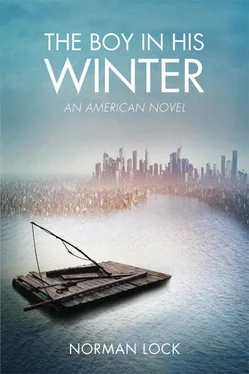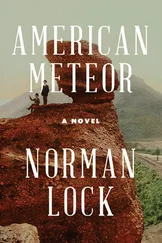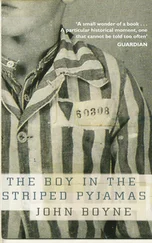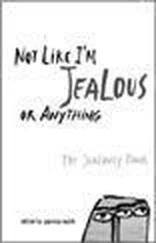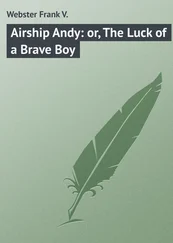“Come into the house,” she said, “and I’ll give you a cool lemonade to drink. You look all hot and sweaty.”
I could see Jim wanted to light out of there. But he was hesitating. Maybe because of his desire to go to New York City, maybe because of something that had to do with Henry Wilson — I don’t know. Jim went inside, and in what seemed like the next instant, he flew out the door again, without his stovepipe hat. He hurried down the street. I followed him to the bus depot and hid behind a pile of mail sacks, where I could see him waiting on the “colored only” side of the station.
One bus departed for St. Louis, another for Chicago. But before the New York City bus could leave, a pickup truck, half-eaten by rust, stopped with a screech of worn brakes in a cloud of dust and black exhaust. Three men in greasy overalls and sweat-stained hats jumped out, grabbed Jim, and threw him into the back of the truck. Behind the steering wheel, a man smoked a cigarette with grim determination; beside him sat Mayella, chewing on her hair. A second truck appeared and then a third — all three filled with the same overalls, hats, and bristling cheeks and chins. They formed a convoy and drove out a dirt road into a mangrove swamp by the river. I’d climbed into the back of the third truck. A man gave me an ax handle and told me to beat the n——with it when we stopped. I held it; it was a kind of ticket to the proceedings. I watched Jim sitting in the truck ahead of us, his feet dangling from the tailgate as if he were going to a picnic. He didn’t struggle; he never said a word. I hoped he didn’t see me.
What is it you want to know? Did I want to see Jim lynched? Is that what you think?
No, I did not. I don’t know what I wanted as the truck bounced and bottomed out on the ruts, but it wasn’t that. I held the ax handle. I was scared. I prayed they’d just give Jim a beating and let him go. I held the ax handle, but I had no intention of hitting Jim with it. Can’t you understand what goes through a boy’s head at a time like this? I was scared, and I wanted to be sick. The men with me were like drunks: eyes glazed, mouths open in an ugly leer, their lips white and gummy with saliva, strings of spit stretching like rubber bands when they opened their mouths to curse the n——, to scream how they would kill the n——. Jesus Christ, I wished I were back on the raft with Jim, or without him! I held the ax handle and felt tears start in my eyes and wiped them in shame with the dirty back of my hand. I think I said to the man next to me that I wanted to get off the truck. But the truck didn’t slow until the road came to an end, and then all three trucks stopped. I think I jumped out and crawled inside a clump of cottonwood bushes and lay on my belly and shook. I think that’s what I was doing when they pulled Jim down from the back of the truck and put the rope around his neck and hoisted him up on a branch. I don’t remember if I looked. All I remember is the noise the rope made while it swung slowly back and forth with Jim’s deadweight at the end of it. Then it began to rain. They didn’t leave him dangling in the tree. They made a joke about sending a package to New Orleans. They cut Jim down and threw him into the river, with a length of rope still around his neck. The way they laughed, it must have been funny.
I waited in the cottonwoods until night came, and then I stumbled through the brush to the river, where I made my way along the shoreline to the raft. I rowed out to the middle of the river and tried not to think of Jim anymore.
I SURRENDERED MYSELF TO THE RIVER, its secret purposes. But the river said nothing, except in the way of water: liquid syllables unintelligible to my ordinary mind. Jim might have understood, but not I. Which is not to say that I, like any other boy, did not hear voices in the babble. But they were only those spoken by a childish imagination: the bloodthirsty speech of pirates, the boastfulness of riverboat gamblers, the bravado of soldiers on their way west to subdue the Indians. I knew none of it was real. I was tormented by loneliness.
The beauties on the way. There was none to be had; nothing to excite the senses or busy the mind with the effort of recognition, nothing to uplift the heart or lighten the gloom, nothing to resist the pull of memory and the gnawing of remorse.
Was I sorry?
No, yes, no — what could a boy have done against a dozen ruffians with ax handles, knives, lead pipes, and a rope that knotted readily around Jim’s neck, as if the destiny of hemp were to lynch black men? What could I have done other than I did, which was to shut my eyes, to wait for the dark, to get away, to get back aboard the raft and wash my soiled pants in the river?
Courage?
Courage didn’t come into it. I was obedient to my body, whose every cell screamed self-preservation.
Time must have finally stopped or come as near to stopping as the laws governing physical existence allow. I saw an old movie made from an H. G. Wells story about an insignificant man whom the gods give superhuman abilities. He stops the earth from turning, and everything — houses, cities, people — flies off into space. I must’ve been afraid of something like that happening, although I wonder if I even knew that the earth turned. I was a fairly ignorant boy, remember; and such a fact would not have been common knowledge among children of the 1830s. What did, in fact, occur was — how do I describe it? Think of how it is when the balance between light and dark tips, when there is more night than day, when light seems to drain out of things and things begin to fade, growing more and more indistinct. I seemed to be drifting — no, not drifting: stalled. No, not even stalled, for one can sense in that word the potential to move. But I sensed no such thing.
What did I sense?
I sensed murkiness, gloom, faint noise, a smell like ozone, the taste of a nine-volt battery when you lick the terminals, the sound you sometimes hear when you put your ear to a railroad track, a grayness, a sullenness, the smell of old cellars, a lassitude, a numbness, a noise of a solitary airplane high above the earth, turbidity, odor of dust, of earth, of nothing at all, the taste of stale water, stale air, smell of old books, of must, tar, blood, burning oil. All of it. None of it. I was alone. That much I knew if I knew nothing else. The river was gone, or I was steeped in it so completely that I could no longer recognize it, any more than one who is sleeping can recognize sleep. Not that I was asleep. While my sensations were barely intelligible, I did feel; I was aware of tastes and odors, no matter that they seemed to float free of any source. They were a sensory reality proving to me that I was not dreaming and could not have been asleep.
Decades passed unknown to me: 1960, 1970, 1980, 1990. . I was aware of little more than those raw, confused sensations. Things did happen in the world, of course: wars, the collapse of regimes and economies, revolutions, riots, assassinations, epidemics, more wars, mass slaughters, catastrophes, murders, extinctions, space flights, moon landings, the discovery of exotic particles, dark matter and energy, black holes, the age and origin of the universe, inventions, elations, horrors — fear happened and death and love also happened, but not for me. I knew the history of the era, only because I read about it much later. But by that time, I was living among men and women who had no memories, who were indifferent to public events in the wider world; like them, I was improvising from day to day, like a man without attachments or a future. I had forgotten the river. I don’t know whether or not the river had forgotten me.
The second millennium arrived without my noticing.
Time weighed on me hardly at all. I was not in it — or if I was, I was like the raft, lightly held by the river, without a keel to bury me in its element. Like the raft, I displaced very little; and that is the secret to existing apart from time. To be weightless is to be outside time, the heaviest element. I sensed my future was drawing near — that is, the point where I would reenter the world. I believed it would be Mexico, that old dream. Had Jim ever talked to me of Mexico? I can’t remember.
Читать дальше
